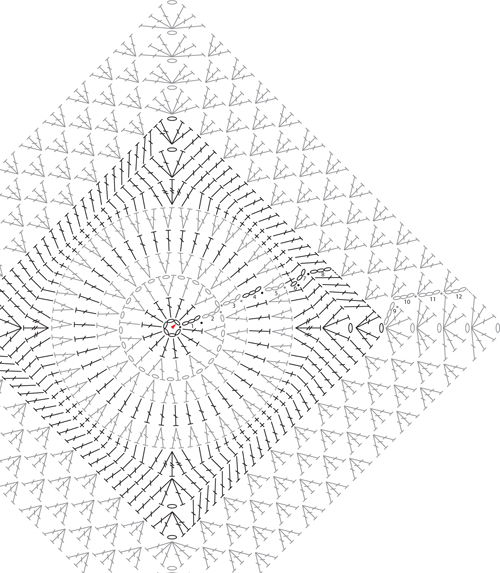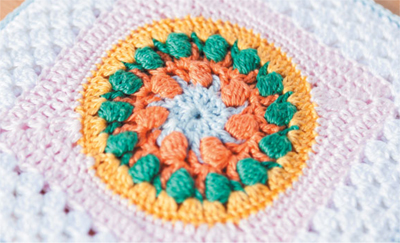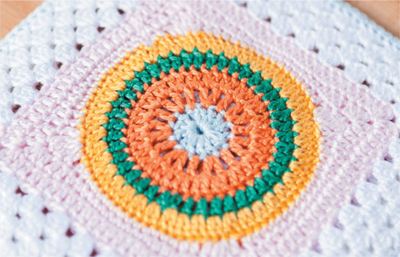
Where would crochet be if it weren’t for the rise of granny chic? It is hardly worth thinking about! If, like me, you are a huge fan of this style trend, then this potholder is a must for your crochet make list as no potholder wall will be complete without it. Its gorgeous colour combination of emerald, orange and sunny yellow with just a hint of pretty pink and blue is vintage folk style, and epitomizes all that we love about granny chic.


Front panel with edging
Any standard 4ply (fingering) weight cotton yarn can easily be substituted for the stated yarn; however, substituting the stated yarn may alter the yarn amounts required and the finished size.
5tr-fpcl = five treble front post cluster
7 rnds in tr sts (12st increase each rnd) = 10cm (4in)
16.5cm (61⁄2in) from edge to edge
22cm (83⁄4in) from point to point
In crochet, turning a circular motif into a square one (squaring a circle) can sometimes be tricky, especially as your tension can influence the outcome greatly. If your potholder begins to cup or ripple a little when working rounds 7 to 9, it’s likely that the blocking process will resolve the issue. However, if it begins to resemble a bowl or becomes too floppy, re-check your tension and adjust your hook size accordingly.
Foundation ring: using yarn A and 3mm hook, leave a 30cm (12in) tail of yarn, ch6, ss to form ring
Round 1: ch3 (counts as first tr), 13tr into ring, ss into 3rd of starting ch3
Round 2: ss between ch3 and first tr of prev rnd, ch4 (counts as first tr, ch1), *†[2tr shell, ch1] between next 2sts†, [tr, ch1] between next 2sts* rep from * to * 6 times, rep from † to † once more, ss into 3rd of starting ch4, fasten off
Round 3: join yarn B between sts of any 2tr shell of prev rnd, ch5 (counts as first tr, ch2), *†5tr-fpcl onto tr, ch2†, tr between sts of 2tr shell, ch2* rep from * to * 6 times, rep from † to † once more, ss into 3rd of starting ch5
Round 4: ss into next ch-sp, ch4 (counts as first tr, ch1), [tr, ch1] twice into same ch-sp, [tr, ch1] 3 times into each ch-sp around, ss into 3rd of starting ch4, fasten off
Round 5: join yarn C between ‘tr, ch1’ repeats of prev rnd, ch4 (counts as first tr, ch1), *†miss tr of prev rnd, 5tr-fpcl onto next tr, ch1†, miss tr of prev rnd, [tr, ch1] into next ch-sp* rep from * to * 13 times, rep from † to † once more, ss into 3rd of starting ch4, fasten off
Round 6: join yarn A in any ch-sp, ch3 (counts as first tr), 2tr into same ch-sp, 3tr shell into each ch-sp around, ss into 3rd of starting ch3, fasten off
Round 7: join yarn E in same space as ss of prev rnd, ch1, dc into base of ch1, dc into 11sts, *†htr into 2sts, miss 1 st of prev rnd, tr, 3dtr inc, tr, miss 1 st of prev rnd, htr into 2sts†, dc into 12sts * rep from * to * 3 times, rep from † to † once more, ss into first dc
Round 8: ch2 (counts as first htr), htr, dc into 8sts, htr into 3sts, tr into 3sts, *†[2tr, ch1, 2tr] into next st†, tr into 3sts, htr into 3sts, dc into 8sts, htr into 3sts, tr into 3sts* rep from * to * 3 times, rep from † to † once more, tr into 3sts, htr, ss into 2nd of starting ch2
Round 9: ch3 (counts as first tr), tr into 17sts, *†[2tr, ch1, 2tr] into corner ch-sp, miss 1 st of prev rnd†, tr into 23sts* rep from * to * 3 times, rep from † to † once more, tr into 5sts, fasten off invisibly
Round 10: join yarn F in any corner ch-sp, ch3, *†miss 3sts of prev rnd, 3tr shell into next st, [miss 2sts, 3tr shell into next st] 7 times†, [3tr, ch1, 3tr] into corner ch-sp* rep from * to * 3 times, rep from † to † once more, [3tr, ch1, 2tr] into last corner ch-sp, ss into 3rd of starting ch3
Rounds 11–13: rnd 10 sets the pattern for a traditional granny square design, continue in this way working 3tr shells between those of the prev rnd and [3tr, ch1, 3tr] into each corner, fasten off invisibly
Foundation ring: using 3mm hook and yarn A, ch6, ss to form ring
Round 1: ch3 (counts as first tr), 13tr into ring, ss into 3rd of starting ch3 (14sts), fasten off
Round 2: join yarn B in any st, ch4 (counts as first tr, ch1), *†[tr, ch1] twice into next st†, [tr, ch1] into next st* rep from * to * 6 times, rep from † to † once more, ss into 3rd of starting ch4 (21sts)
Round 3: ss into next ch-sp, ch3 (counts as first tr), tr into same ch-sp, 2tr inc into each ch-sp around, ss into 3rd of starting ch3 (42sts), fasten off
Round 4: join yarn C in any st, ch3 (counts as first tr), tr into each st around, ss into 3rd of starting ch3 (42sts), fasten off
Round 5: join yarn D in any st, ch3 (counts as first tr), tr into base of ch3, 2tr inc into each st around, ss into 3rd of starting ch3 (84sts), fasten off
Round 6: work as given for rnd 7 of front panel
Round 7: work as given for rnd 8 of front panel
Round 8: work as given for rnd 9 of front panel
Round 9: work as given for rnd 10 of front panel
Round 10: work as given for rnd 11 of front panel
Round 11: work as given for rnd 12 of front panel
Round 12: work as given for rnd 13 of front panel

Back panel

Front panel

Back panel
Weave in loose ends of front and back panels. Lay front and back panels together, with WS facing, and line up the stitch pattern. Using the yarn needle and 30cm (12in) tail of yarn, sew the two panels together using a whip stitch through the centre hole and sts of rnd 1; fasten off yarn between the two panels and weave in the loose end.
All of the edging sts are worked through corresponding sts and ch-sps of both front and back panels together.
Round 1: join yarn A in any corner ch-sp, ch1, dc into 39sts along the side, 3dc into corner ch-sp, dc into 3sts
Hanging loop: ch15, working backwards ss into 8th st, ss into 9th st, working forwards 20dc into ch-sp, ss into same space as last dc before 15ch
Continue round 1: dc into 36sts, *†3dc into corner ch-sp†, dc into 39sts* rep from * to * twice, rep from † to † once more, fasten off invisibly and weave in loose ends
Using a press cloth, steam press on reverse with a hot iron.